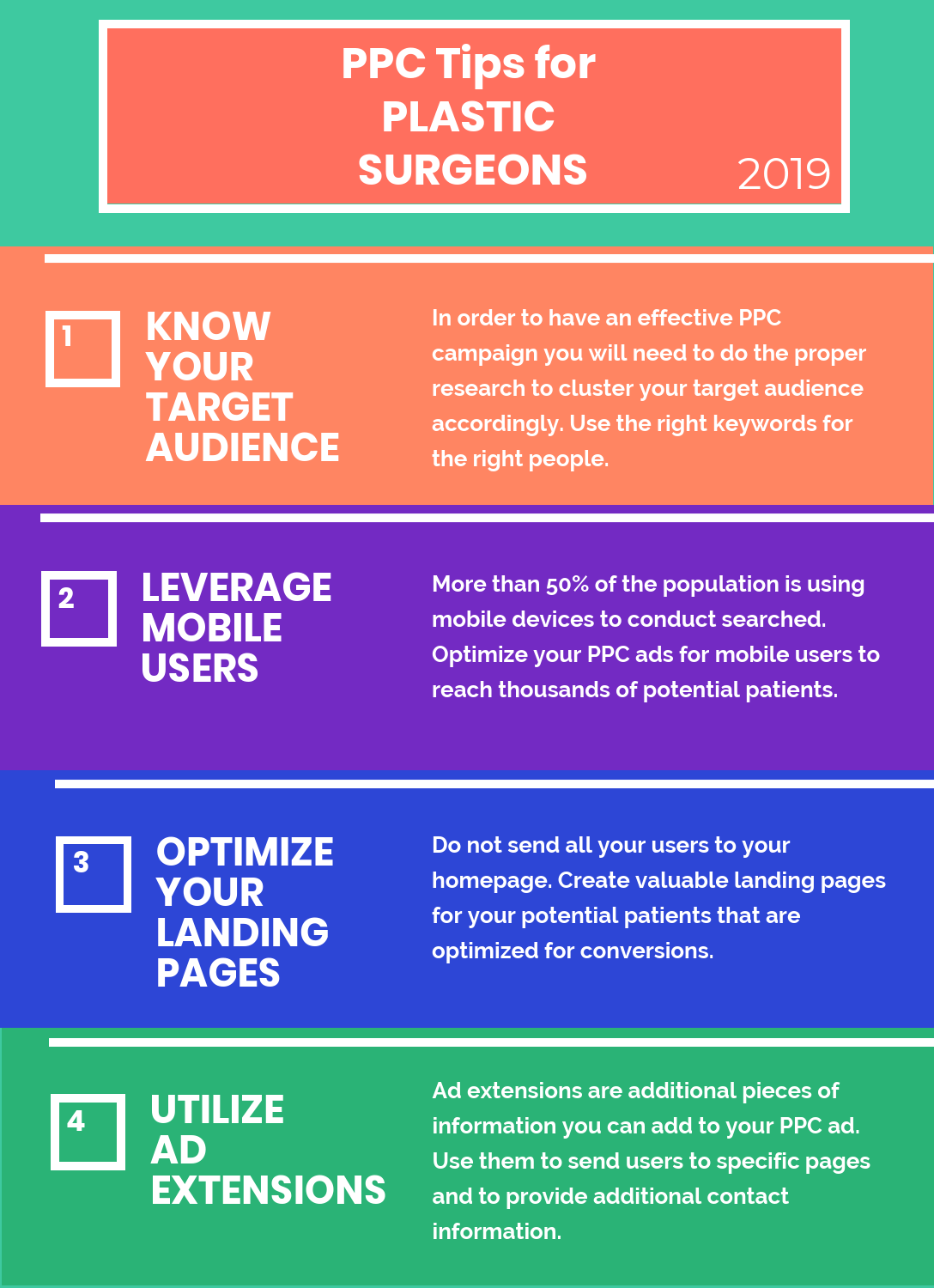A digital marketing strategy is the path to profitability. Optimum7 can help you set the right goals, offer and implement creative and technical strategies, and use data and analytics to review and improve your business’s performance.
Google has reported that one in every 20 searches performed on the search engine is health related. This statistic proves just how competitive the health care industry is, especially when it comes to paid search or pay-per-click advertising. You have competition over search terms with other plastic surgery private practices and hospitals looking for patients that makes bidding on keywords expensive.
You will have to do the proper research to make sure you are bidding on keywords that will provide you with the best results. This is not to mention the many restrictions on paid search the healthcare industry has to follow (HIPPA, Google rules, and healthcare reforms) which makes it difficult for many plastic surgeons to compete in PPC.
Here at Optimum7, we have an in-house team of digital marketing experts with over 10 years of experience using PPC advertising for healthcare professionals. We know how to track:
…and more. Let us guide you to new markets and revenue streams with PPC advertising for your plastic surgery practice.
Speak to an ExpertPay-per-click advertising (PPC) is a form on internet marketing in which advertisers pay a fee every time their plastic surgery ad is clicked. This type of advertising the most popular form of online advertising because you have the ability to determine the search terms you want your plastic surgery practice to show up on and how much money you are willing to allocate for this search term. PPC is done by advertisers bidding on ad placement when users search for keywords related to their business and determining whether these ads will be displayed on Google, social media sites, or other websites across the web related to the business.
Average Increase in Website Traffic
+97%Average Increase in Conversion Rate
+52%Monthly Total Leads Generated
3,000+We become an indispensable resource for our clients to drive traffic and leads.

The most common type of search ads is a Google Ad where paid ads are shown above organic search results. You most likely have seen these types of ads when searching using key terms and seeing a search result with an “Ad” icon on the left-hand side. You want to make sure you target your consumers directly with the right keywords or phrases.
With display ads, you have the liberty to use text, images, or video ads that will be displayed on the website related to the theme of the keywords the advertiser has selected. These ads are effective when used wisely on the right related websites your prospective patients are also navigating through.
Social media ads are paid ads seen on Facebook, Instagram, LinkedIn, and other social media platforms. It is wise to do the proper research to determine which social media platforms are best for plastic surgeons to use to promote new procedures and engage with potential patients by commenting, liking, and sharing ads.
 1. Know Your Audience to Reach Your Audience
1. Know Your Audience to Reach Your AudienceThe healthcare industry is tricky when it comes to developing the right PPC strategy. As a doctor, you want to use the most accurate and sophisticated technical terms but these terms are not what are used by your target audience. An effective paid search campaign ensures that every component of the ads speaks the language that your potential patients use when conducting searches. When bidding on search terms, you do not want to bid on rhinoplasty instead the advertiser should bid on nose job or nose enhancement. Clustering all the patient personas your plastic surgery practice wants to target is a great way to start planning out PPC campaigns in order to make custom search terms for these personas and personalizing your ad campaigns accordingly.
Mobile web browsing is huge, you do want to miss the opportunity to make thousands of dollars by not advertising to mobile users. Conversions can take place on the go and on a desktop so, you want to compare your desktop ads and mobile ads to analyze how each type of paid ad is performing. You will want to conduct some A/B testing to know how mobile impacts your plastic surgery practice. Make the proper big adjustments for certain mobile campaigns to track performance and develop the right PPC campaigns that are company specific.
Sending people to your homepage for every PPC campaign will not provide you with quality results. When potential patients are sent to your plastic surgery homepage they may get distracted from the initial goal of the ad and cause them to leave your website without converting. Landing pages are stand-alone web pages that serve as a source of specific information and objectives for customers to navigate through. These pages usually have few links on them, instead, they are optimized with high-value keywords and clear call to actions to convert these web users to patients. You do not want to overwhelm your readers with endless blocked text, you want to use videos of interviews with surgeons that help create trust between the web browser and your plastic surgery practice.
Ad extensions enhance your ad campaigns by providing additional pieces of information to your ad. These pieces of information can be phone numbers, reviews, site link extensions, and more. You want to use these ad extensions wisely and not clutter your PPC ad with additional features potential patients will be distracted by. Typically ad extensions are seen on Google Adwords campaigns where the extensions will be seen on the search engine results page (SERP) in your Google search ad.
A digital marketing strategy is the path to profitability. Optimum7 can help you set the right goals, offer and implement creative and technical strategies, and use data and analytics to review and improve your business’s performance.